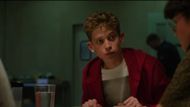The Institute is more than just another Stephen King thriller; it feels like a debate with William Golding's Lord of the Flies. While Golding's novel depicts human nature being stripped away from rules, King's story seems to tell the opposite. Instead of descending into chaos, his young characters cling to morality and unity.
This shift in perspective raises the age-old question: are we born to destroy each other, or to fight together against a greater evil?
Children under pressure: A tale of two worlds
Golding's Lord of the Flies is remembered for its brutal descent into violence. Left all alone on an island, the boys gradually begin to lose their sense of order, turning to violence and the worst of all: fear. No adults ever intervene, and their worst instincts run wild. It's a story built on the idea that, without rules, darkness simply comes from within.
The Institute at King's creates a similar starting point, with young people being isolated from the world, before flipping the outcome. Here, the kids are not left to self-govern. Instead, they're trapped inside a cold facility where adults with motives control every moment of their lives. These children, gifted with telepathy or telekinesis, are manipulated into "serving the greater good" while undergoing invasive tests and psychological abuse.
Yet even under these circumstances, they do not turn on each other. Luke Ellis, the protagonist, becomes a symbol of unity rather than division. In Golding's world, freedom unleashes chaos; in King's, captivity strengthens unity. Speaking to The Guardian, King admitted that Lord of the Flies was one of the most defining books of his youth. But in writing The Institute, he created a counterpoint, suggesting that young people, even in darkness, can resist cruelty together instead of succumbing to it.
The Institute: King’s view on kids, evil, and the fight back
King has often said he writes children "the way that kids really act," balancing bravery with the reality that they can be petty or unkind. But in The Institute, bravery wins. His young characters form bonds despite fear, plotting against the very adults who claim to protect them.
This isn't a case of idealized innocence because they still make mistakes, but their energy is aimed outward, toward dismantling oppression rather than tearing each other down.

Luke's quiet resistance begins with questions no one wants to answer: Why can't they contact their parents? Why can't they leave? Why does punishment feel like torture? His skepticism drives action, inspiring others to resist. Even Ms. Sigsby, the calculating administrator played by Mary-Louise Parker, can't shake their determination.
As an executive producer, Stephen King embraced the adaptation's changes, telling interviewers;
"When I write a book, it's a single-person sport... sometimes, man, they're really good."
Yet, at its core, the story offers a reversal of Golding's bleak thesis. While Lord of the Flies suggests that danger comes from within us, The Institute argues that the real threat often arises from those in power and that survival depends on unity. By shifting the focus from the "kids in isolation" premise, The Institute changes the view of human nature into something much more defiant.
It doesn't deny the existence of evil, but it shifts the blame from instinct to control. In doing so, Stephen King isn't just telling a chilling story but also challenging the idea that chaos is our natural state, instead highlighting the possibility of courage.
Stay tuned to SoapCentral for more.
